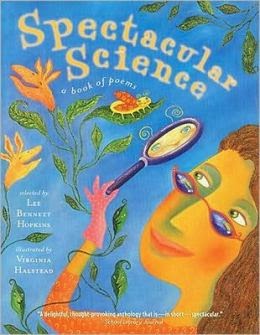- Nonfiction poetry is the exact same as every other kind of poetry with a bonus quality, it is poetry about education, realistic topics. When most people hear the word poems, they think of love, but that isn't always the case. When science, social studies, or even math is presented in poem form it is a new and fun way to introduce young students to the subjects. Nonfiction poetry presents everyday content in a different, and intriguing form for all ages of readers.
Criterion for Quality and Selection:
- Poetry can range in difficulty, even within a single text, so it's important as a teacher to read through first and pick out what is appropriate for the students. We don't want students to start reading a text and understand it, then get to a passage they aren't able to comprehend.
- Since poetry is something most students aren't drawn towards, finding text that is appealing to them is important. There is poetry that covers all types of subjects and interests to please all the students in the classroom. Finding that interests can get the student exciting about reading, and wanting to read.
Use in the Classroom:
- Poetry is a great avenue to go down when working on comprehension with students. It presents material in a different way, and really makes students analyze what they are reading. Poetry is also great for comprehension because poems are usually short, so students won't become too bored with them and give up.
- Going along with the poems usually being short, helps with students working on fluency. With short passages, it will take the students less time to read them, and they can then reread them more times, thereby improving their fluency.
- Pieces of poetry would be great to assign to advanced students during reading times because it requires deeper thinking for understanding.
TEXT EXAMPLES:
Hopkins, L., & Halstead, V. (1999). Spectacular science: A book of poems. New York, NY: Simon & Schuster Books for Young Readers.
Hopkins, L., & Halstead, V. (1999). Spectacular science: A book of poems. New York, NY: Simon & Schuster Books for Young Readers.
- Complex Text Level: 2nd - 3rd
- Grade Level Span for Read-Aloud: 1st - 3rd
- Major Themes:
- Life Science
- Earth Science
- Physical Science
- Worthy Qualities of Writing:
- Large, bright illustrations that correspond with the poems on each page.
- Great text features such as, a table of contents to find specific topics, page numbers, easy to read font, and bold, different colored titles for every poem.
- Use in the Classroom:
- Since there are so many different topics, (rocks, dinosaur bones, and seeds) I would use them to introduce new material as they came up during the year. It would be a great way to ease students into the content.
- Support Needed:
- Preteaching words that are associated with the different areas of science such as, protozoans, prism, metamorphosis, magnifying, glaciers, and geysers.
- Preteaching the different structures of poems.
- Sentences may be split up into multiple lines.
- Some lines start with capital letters, even though they are the middle of a sentence.
- Rhythm in the writing by having rhyming words at the end of lines.
Worth, V., & Jenkins, S. (2007). Animal Poems. Vancouver, BC: Douglas & McIntyre.
- Complex Text Level: 3rd - 4th
- Grade Level Span for Read-Aloud:
- 2nd - 3rd
- Major Themes:
- Animal Characteristics
- Different Animal Families
- Worthy Qualities of Writing:
- Extremely detailed illustrations that correlate precisely to the text.
- Cover picture example text: "Thicket of its own thorns" "Flower out of that cold bower of spines."
- As I mentioned with the text examples above, each animal has text that gives detailed characteristics in a way that allows students to visualize the animals if no illustrations were provided.
- Support Needed:
- Some of the characteristics given for each animal, could be difficult for students to decipher and comprehend. The names of each animal are given along with an illustration, so students can refer to that as well.
- "Their hollow veils and trailed clappers peal eternal knells" -Jellyfish
- "Not like my shadow I dislike, but that sad sunlight creeping so weak across the winter-weary snow" -Groundhog
- Preteaching some of the more difficult terms: clamber, latticed, knells, and sumptuous.


No comments:
Post a Comment